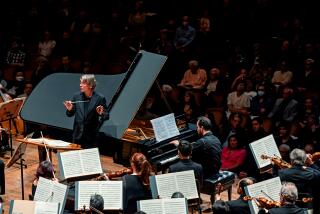ALDO CICCOLINI: THE PIANIST AS PHILOSOPHER
- Share via
Time is not of the essence for Aldo Ciccolini.
At 5:30 in the evening, nearly half an hour past the scheduled conclusion of his master class at UCLA, the Italian-born pianist shows no urgency to cut short the student playing Schumann’s “Fantasiestuecke.” Fully absorbed, Ciccolini hovers over the keyboard and later makes a few simple yet profound observations on the interpretive matter at hand.
“There is no such thing as being too busy or too tired for this or that,” says Ciccolini, now settling into a leather couch in a nearby lounge. “We always have time for what we want to do and we make excuses for the rest. Our culture tells us, wrongly, that we must give reasons for what we desire.
“Me? I want to play more. I am more and more in love with music and playing. So I learned to sleep while crossing the Atlantic and to need only three hours a night.”
At 61, the acclaimed artist--dapper, charming and urbane--gesticulates freely. A tinge of irony coats his words as he explains away an inaccurate image previously “fabricated by journalists who liked the idea that I recorded all of Satie’s piano music and practiced Zen Buddhism and became a French citizen.”
But just as time limitations do not interfere with Ciccolini’s musical or personal affairs, neither do such passing issues as building popularity. The recital he plays here today at Royce Hall is not designed for self-aggrandizement. In fact, he insists that only a limited public will be attracted to Liszt’s “Harmonies Poetiques et Religieuses,” an evening-long cycle that he claims has not had a public performance in its entirety by any other pianist.
If a musician wants to honor the 100th anniversary of the composer’s death, says Ciccolini, “that homage should involve something special,” not the usual Romantic potboilers that commonly adorn recital programs. Only two items from the cycle, “Benediction” and “Funerailles,” will be familiar, he says.
Apart from its musical interest, Liszt’s work has a literary source, having been inspired by a work of the same title by the composer’s peer in spiritualist interests, poet Alphonse de Lamartine. Ciccolini finds considerable insight into the score via its narrative. Earlier, during the master class, he could say of “Gaspard de la Nuit” by Ravel: “The madness that is this music, a horror equivalent to an Edgar Allan Poe story.”
As for whether today’s offering will display his abundant talents well enough, he waves aside such concerns.
“I should be a very foolish pianist if I had to worry about reinforcing my popularity at Royce Hall,” says Ciccolini with the slightly husky, growling laugh of a Maurice Chevalier. “People will not speak of me in 100 years, but they will still be talking about Liszt. That’s the reality.”
And the philosophic pianist takes an equally open-eyed view of the meaning of publicity, which he discredits “for creating talents and non-talents.
“It (publicity) comes too easily and means too little. All one has to do for fame is say outrageous things. But what happens to superstars? They end up needing the cover of celebrity and having a lot to hide. Their public stops listening and just gawks.”
Ciccolini might have opted for such superstardom several years ago when he popularized the music of Satie, playing it at such boites as the Bottom Line in New York. But he never followed through with the image “because I wanted to remain an artist.
“And that’s still my focus. Only before, I always played what others avoided. Soon, on my next tour, I’ll make an exception--playing the 32 Beethoven sonatas, but stretching them out as I see fit.
“Time is made to be stretched. Nothing in nature tells us to hurry. We must find our own tempo.”
More to Read
The biggest entertainment stories
Get our big stories about Hollywood, film, television, music, arts, culture and more right in your inbox as soon as they publish.
You may occasionally receive promotional content from the Los Angeles Times.










